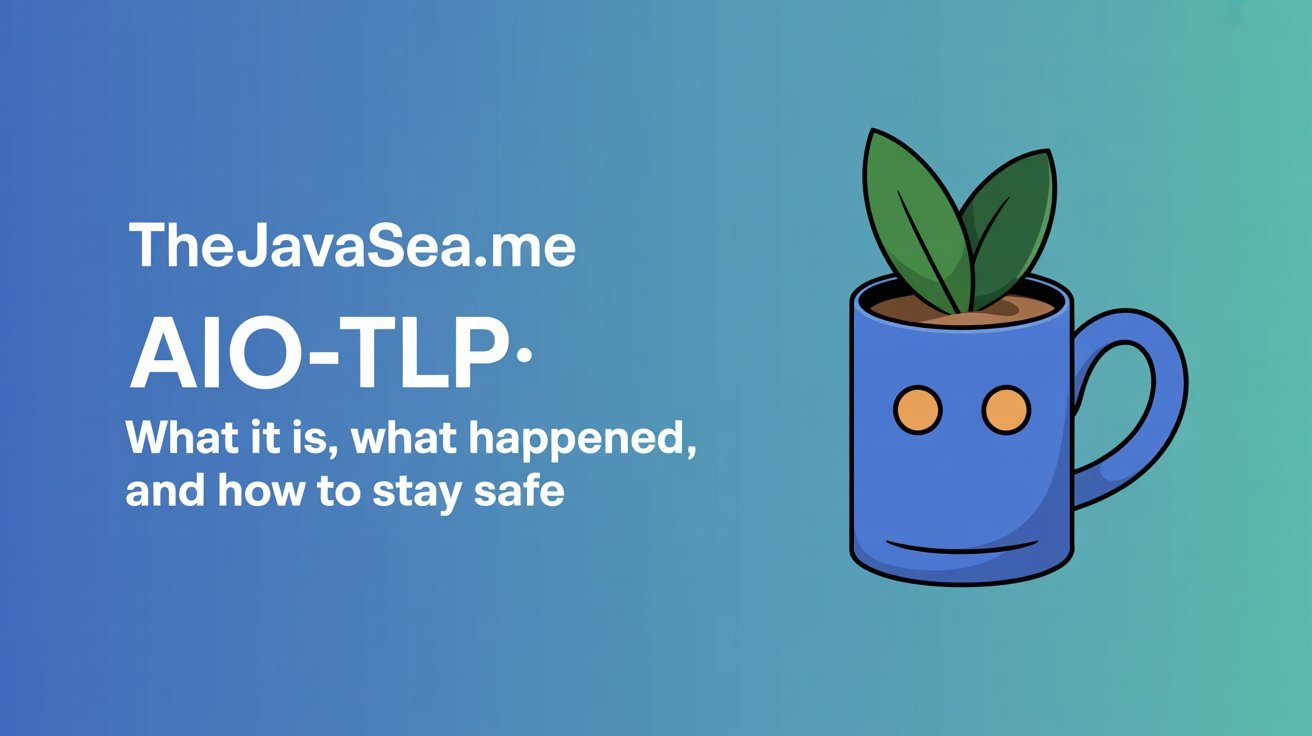In recent months, one phrase has started to appear more often across cybersecurity discussions, forums, and casual searches: thejavasea.me leaks aio-tlp. For those unfamiliar with these terms, it might sound technical, mysterious, or even like jargon. However, what’s behind these leaks is a growing concern for online privacy, safety, and legality. This article aims to provide a clear and detailed explanation of what this term means, what risks are associated with it, and most importantly, how individuals can protect themselves. By the end, you’ll have a clearer understanding of why these leaks matter and what to do if you come across them.
What Is Thejavasea.me?
To understand thejavasea.me leaks aio-tlp, it’s important to first examine the platform itself. Thejavasea.me appears to function as a website or forum that has gained attention for allegedly hosting or indexing leaked content. Like many leak-related hubs, its reputation grows through the circulation of “exclusive” bundles, forums, and thread-based sharing. These types of websites often advertise themselves as repositories for “leaked data” or “all-in-one packs,” which can attract curious individuals, hackers, or researchers.
The structure of such sites is typically straightforward. Users register or visit public-facing pages, where they may find categorized threads containing downloadable links, reposted materials, or references to third-party mirrors. The presence of AIO (all-in-one) packs is especially appealing to certain communities because it consolidates vast amounts of information or data into a single package. However, the risks tied to such sites extend far beyond curiosity. Malware infections, phishing, identity theft, and legal issues all hover around these platforms like shadows.
What Does AIO-TLP Mean?
When discussing thejavasea.me leaks aio-tlp, the acronym “AIO” stands for “All-In-One.” This term signals that what’s being shared is not just a single document, but a comprehensive bundle containing numerous files, data points, or resources. These all-in-one bundles are meant to appear convenient, but they often mix legitimate information with harmful or malicious elements.
“TLP,” on the other hand, can mean different things depending on context. In cybersecurity, TLP stands for Traffic Light Protocol, which is a classification system used to mark the sensitivity of shared information. TLP tags (like TLP:RED, TLP:GREEN, etc.) are designed to manage how far information can be distributed. On leak forums, however, the tag “TLP” may be misused, repurposed, or simply attached to make a bundle appear more technical or credible. For casual observers, the tag suggests “special” or “restricted” content, thereby creating hype.
Put together, AIO-TLP bundles on thejavasea.me often imply large packages of sensitive, potentially restricted information that may not be meant for public circulation.
The AIO-TLP Leak Timeline
The rise of thejavasea.me leaks aio-tlp can be traced through a simple timeline of interest. At first, references appeared in smaller online circles, often tied to leak-sharing communities. As more users began searching for these bundles, the term spread further across the web. Searches spiked during specific months, indicating that new “versions” or updates of AIO-TLP packages were released or discussed.
Like most leak-based narratives, the cycle follows a pattern:
- Initial Drop – An AIO-TLP bundle is mentioned or uploaded.
- Community Sharing – Links and mirrors are distributed across social media, messaging platforms, or smaller forums.
- Amplification – Curious searchers drive attention to the keyword.
- Saturation – Multiple “mirrors” appear, making it difficult to verify the original.
- Decline – Interest wanes until a new update appears.
This cycle keeps the interest alive but also perpetuates misinformation and risk exposure.
What’s Inside an AIO-TLP Bundle?
A central question for many is: what exactly do these leaks contain? While the specific content of thejavasea.me leaks aio-tlp can vary, these bundles usually include:
- Credential dumps (usernames, emails, and passwords)
- Documents (scanned IDs, confidential files, contracts)
- Media files (photos, videos, sometimes manipulated content)
- Configuration files (software setups, exploit codes)
- Guides or tutorials (hacking tools, illicit methods)
The “all-in-one” packaging suggests that instead of downloading multiple sources, a single bundle provides everything. While this may seem attractive for data seekers, it significantly raises risks for anyone downloading such material.
Risks for Users Exploring Leak Sites
The dangers of engaging with thejavasea.me leaks aio-tlp extend well beyond curiosity. Key risks include:
- Malware Infections – Leaks often come bundled with trojans, spyware, or ransomware disguised as files.
- Phishing – Fake mirrors or download sites prompt users to enter credentials, leading to theft.
- Identity Theft – Accessing leaks could expose users’ own personal information if they’ve been compromised.
- Legal Repercussions – Downloading or sharing leaked data can be illegal, even if accessed unintentionally.
- Reputation Damage – Being associated with forums hosting leaks could create trust issues in professional and social circles.
For these reasons, engaging with these leaks is never risk-free.
Legal Questions: Is It Safe or Allowed?
A pressing concern is whether accessing or sharing thejavasea.me leaks aio-tlp is legal. In most jurisdictions, the answer is a firm no. Even viewing certain leaked content can cross ethical and legal boundaries, particularly if the content involves stolen credentials, personal data, or copyrighted materials. The law often does not differentiate between those who host leaks and those who consume them.
While some may argue that “just browsing” doesn’t carry consequences, authorities have previously prosecuted individuals for downloading or redistributing leaked data. Cyber laws are tightening globally, and involvement in such activities can easily escalate from curiosity to liability.
How Leaks Like This Spread
Leak bundles like AIO-TLP follow a predictable distribution model. It usually starts with a forum drop, which is then amplified by mirrors (secondary hosting sites). From there, links spread via social media, Discord servers, Reddit communities, or even encrypted messaging apps. Aggregators and indexers further push the material into search engines, allowing casual users to stumble upon them. Each stage increases risk because authenticity declines while malicious repacks multiply.
How to Protect Yourself from AIO-TLP Leaks
If you are worried about thejavasea.me leaks aio-tlp, the best defense is prevention. Here are concrete steps:
- Use Safe Browsing Practices – Always sandbox risky sites or use a virtual machine.
- Run Security Tools – Updated antivirus, endpoint detection, and browser security add-ons are essential.
- Reset and Protect Passwords – Rotate your passwords regularly, use strong combinations, and enable MFA.
- Monitor Breach Alerts – Use services that notify you if your email or data appear in known breaches.
- Limit Personal Data Exposure – Share less online and avoid reusing passwords across sites.
Following these measures drastically reduces the chance of harm.
If Your Data Appears in Leaks
Discovering that your own information is part of thejavasea.me leaks aio-tlp can feel overwhelming. If this happens:
- Verify the Exposure – Check reputable breach databases.
- Respond Quickly – Reset affected passwords, inform your bank, and enable fraud alerts.
- Seek Professional Help – For identity theft, contact local authorities or credit agencies.
- Monitor Long-Term – Keep watch for unusual account activity or new breaches.
Debunking Common Myths
Many users believe misconceptions around leaks. For example:
- “Old leaks don’t matter.” (False – old data can still be exploited.)
- “It’s safe if it’s just a text file.” (False – malicious scripts can be hidden in plain files.)
- “Private links aren’t indexed.” (False – search engines and bots frequently index shared content.)
Safer Alternatives for Research
For those genuinely interested in understanding data security without risking legality, alternatives exist. OSINT tools, public breach reports, and academic studies allow researchers to learn about leaks without engaging in illegal downloads. Transparency reports from tech companies also provide insights into how breaches are managed.
Final Takeaways
The phrase thejavasea.me leaks aio-tlp is more than just a trending keyword—it represents the growing dangers of digital leaks, packaged bundles, and unsafe browsing. While curiosity drives many to investigate these leaks, the risks—malware, identity theft, legal issues—outweigh the benefits. The best approach is proactive protection, strong cybersecurity hygiene, and reliance on legitimate information sources.
Also read more interesting topics at mgtimes.co.uk.






Leave a Reply